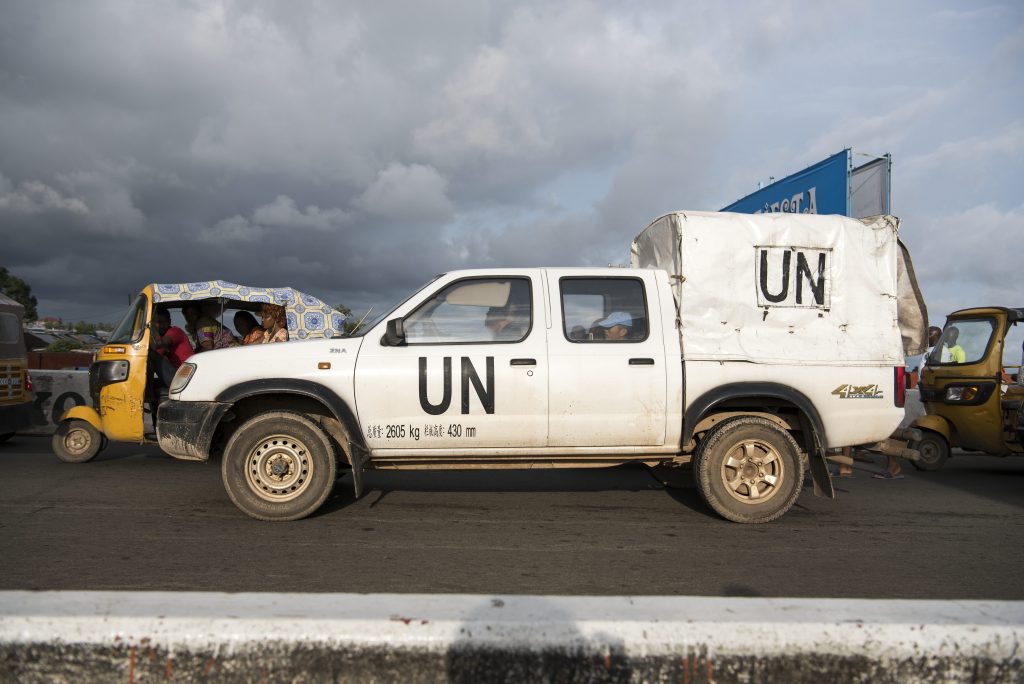Although most UN peacekeeping personnel perform their jobs with courage, dedication and professionalism, a few commit sexual offences that can ruin lives and betray the trust of those that they were sent to protect. Rosa Freedman, Professor of Law, Conflict and Global Development, recently travelled 16,000 miles across three continents to meet with victim’s rights advocates, UNICEF and representatives of the UN. Together they are developing proposals for policies that will help keep more children safe, as she explains here.

In January, I was invited to speak at the UK Mission to the UN in New York on Sexual Abuse and Exploitation: Justice and Accountability. The meeting, with the UN Secretary General’s Victim’s rights advocate Jane Connors, also included Lord Ahmed of Wimbledon and Jonathan Allen, the UK Deputy Permanent Representative to the United Nations in New York, and representatives from UNICEF.
It was a valuable opportunity to highlight my work with the UK charity Keeping Children Safe. We are implementing a robust, evidence-based toolkit for UN peacekeeping forces to help reduce the number of offences and to hold perpetrators to account.
A complex legal situation
A key problem within humanitarian and conflict settings is that current laws, policies and practices operate across international, regional and local scales. This means that organisations require knowledge and understanding of the range of laws, policies and contexts that apply. This is particularly difficult when those organisations have to act quickly in an emergency situation, or when rule of law has broken down within a society. In those most fragile contexts, the opportunity for impunity for crimes or harms caused are significantly higher.
We work with each organisation or entity to carry out a comprehensive mapping of laws and practice on safeguarding in the countries in which they operate. We identify areas of weakness and strength and then co-produce safeguarding measures. These measures are sensitive to the local culture but uphold international standards on who is a child and what constitutes abuse.
International policy
The work is helping to inform policy development at an international level. Following my meeting in New York I travelled another 7,000 miles to Addis Ababa in Ethiopia, to speak at the United Nation Peacekeeping Ministerial Preparatory Meeting to discuss ‘Sexual Exploitation and Abuse: Strengthening victim assistance and policy coherence’.
The primary aim here was to finalise our proposals for coherent and pragmatic policies to support the Secretary General’s Action for Peacekeeping initiative (A4P). The proposals will be shared, and potentially adopted, at a summit of the Peacekeeping Ministerial at the United Nations Secretariat Headquarters in New York on 29 March 2019 themed ‘Uniformed Capabilities, Performance and Protection’.
Since 2000, the UN Security Council has set successive targets to increase the deployment of women to peace operations in military and policing roles to help redress issues of gender balance. More recently, in 2015, the UN Security Council called the number of women in military and police peace- keeping contingents to be doubled by 2020. Since then, the overall rate has increased by just 0.2%, from 4.2% to 4.4%.
43 ideas for change
To accelerate change, the Secretary-General’s Action for Peacekeeping (A4P) initiative lists 43 undertakings, focussing on peace keeping, people, partnerships, performance and political solutions, to renew political commitment to peacekeeping operations. It also lays the groundwork for ensuring that the Women, Peace and Security (WPS) initiative is integrated into peacekeeping efforts.
We continue to work in countries around the world to reduce levels of abuse. We are delighted to be working with international policy makers and influencers to endorse the Secretary-General’s zero-tolerance policy on sexual exploitation and abuse with its victim-centred approach.
Read more about Rosa Freedman’s research and resources
Find out more about Keep Children Safe campaigns and resources
